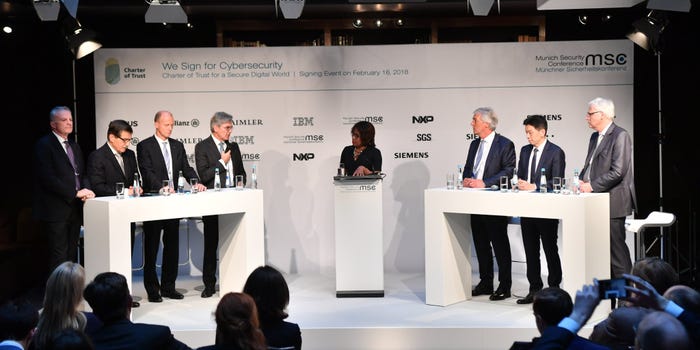How Siemens’ Charter of Trust Aims to Improve Industrial Security
In this exclusive op-ed, Siemens CEO Joe Kaeser explains why the company is teaming up the likes of Airbus, Allianz, Daimler, IBM and others to tackle industrial cybersecurity.
February 16, 2018

By Joe Kaeser
Siemens was born in Germany, grew up in Europe, and is at home in the world. We are proud to do business in nearly every country across the globe. For it not only gives us a unique perspective into the challenges facing humanity in the 21st century; it drives our belief that we must deliver solutions that improve society.
Our 171 years of experience have also shown us that the best way to make a lasting difference isn’t as one company, but as an industry – not only as one nation but as part of a global community. In modern history, competitor businesses have forged standards together that have carried the world from one industrial revolution to the next – including the unfolding digital transformation of industry. Countries without clear-cut geopolitical alliances have come together to forge cross-border agreements that have grown trade and advanced peace.
It’s in this spirit that Siemens is launching a new Charter of Trust today at the Munich Security Conference, a longstanding forum for business and government leaders to discuss geopolitical issues. With the Munich Security Conference, Airbus, Allianz, Daimler, IBM, NXP Semiconductors, SGS, and Deutsche Telekom, Siemens will create a first-of-its-kind global alliance focused on answering a very important question: How do we secure critical infrastructure – from our factories to our power grids – in the digital age?
The initiative also is being welcomed by Canadian foreign minister and G7 representative Chrystia Freeland and witnessed by El?bieta Bie?kowska, the EU Commissioner for Internal Market, Industry, Entrepreneurship and Small and Medium-sized Enterprises. Together, we are carrying an important message: that when we talk about security today, it isn’t just about diplomacy and resolving military conflicts – it is increasingly about cyber attacks that seek to undermine our democratic and economic values.

Digital industry is moving forward. There’s no turning back. The advantages of combining the physical world of manufacturing products, producing energy, optimizing a building or operating a train with the virtual world of software, robotics, big data and artificial intelligence are simply too significant to ignore. This transition is already enabling our customers to do bigger things than would have ever seemed possible in terms of speed, flexibility, efficiency, reliability and connectivity.
Now we must face the risks head on. We know that criminal actors are increasingly focused on hacking into digitalized critical infrastructure. Their techniques are becoming more sophisticated. For every business and critical infrastructure organization, cyber attacks are a growing, round-the-clock reality.
In the United States, Siemens’ largest market in the world, cyber attacks on manufacturing plants nearly doubled from 2015 to 2016. And the energy sector, in particular, represents a growing target.
A recent study of the U.S. oil and gas industry by the Ponemon Institute found that 68 percent of respondents had experienced at least one security compromise in the past year. Notably, 30 percent of all attacks had targeted operational technology (OT). In other words, the hackers aren’t just trying to infect computer networks; they’re actively trying to turn off power systems or take over autonomous machines. Meanwhile, the U.S. Department of Energy reported last year that America’s electricity infrastructure was in “imminent danger” from cyber attacks that are “growing more frequent and sophisticated.”
Our Charter of Trust then begins with these three goals:
protecting the data and assets of individuals and businesses;
preventing damage to people, businesses, and infrastructures;
building a reliable basis for trust in a connected and digital world.
We know at the outset that a one-size fits all approach won’t work. We have instead agreed to 10 principles – from ensuring the highest levels of responsibility for cybersecurity within every company, to securing supply chains, products, and working with governments. Together, we will develop and continuously improve coordinated strategies and shared standards to protect critical infrastructures, public facilities and private companies.
I want to emphasize that this is a starting point. Today we also extend an invitation to companies that share our ambition and ownership for trust to join our initiative. We also invite governments and civic leaders to engage in a focused dialogue around the cybersecurity of critical infrastructure. Because trust not only matters to everyone; ultimately it’s everyone’s task to make both the real and the digital worlds safer places for all of us.
To date, the digital economy has evolved faster than cybersecurity. Going forward, we will help ensure they evolve together.
Joe Kaeser is the President and CEO of Siemens AG. You can learn more about the Charter of Trust on the Siemens website.
Note: The views and opinions expressed in this article are those of the author and do not necessarily reflect those of Informa.
You May Also Like






